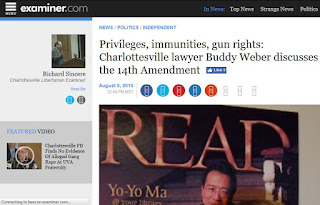From the Archives - Privileges, immunities, gun rights: Charlottesville lawyer Buddy Weber discusses the 14th Amendment
Privileges, immunities, gun rights: Charlottesville lawyer Buddy Weber discusses the 14th Amendment
August 6, 2010 12:49 PM MST
In a recent post on the group blog, The League of Ordinary Gentleman, the Cato Institute’s Jason Kuznicki discusses the history and understanding of the Fourteenth Amendment to the U.S. Constition.
He further explains that “our constitution must absolutely be a set of general principles pointing at liberty, combined with a set of specific operating procedures for government. It needs to be a general grant of liberty, and a limited grant of power, because a limited grant of liberty very quickly begins to eat itself. General grants of liberty, however, must be expressed in general terms, and this necessarily leaves the working out of particulars to each subsequent generation.”
Fourteenth and Second Amendments
Kuznicki’s blog post fits in nicely with the argument made by Charlottesville attorney Charles “Buddy” Weber on WINA-AM’s The Schilling Show earlier this week, during a discussion of two recent Supreme Court decisions that addressed the right to keep and bear arms.
In an interview with the Charlottesville Libertarian Examiner on August 5, Weber summed up the two cases, District of Columbia v. Heller (2008) and McDonald v. Chicago (2010).
 |
| Buddy Weber |
In Heller, Weber explained, “the interesting thing about the case, although it came out 5-4, was that all of the justices used originalism as the basis for their argument. I know we’ve always heard about the debate among the justices between originalism vs. the ‘living constitution’ concept. Those in favor of the living constitution have always critiqued originalism as a basis for interpreting the constitution.”
What this shows, Weber continued, is “that reasonable people can disagree as to what the history really was, but it boiled down to the plain meaning of the language of the Second Amendment. When it says ‘the right of the people to keep and bear arms’ does ‘the people’ really mean the people, or does it mean ‘the government’?”
Weber was particularly impressed by the reasoning of Justice Clarence Thomas in his concurring opinion in McDonald.
Incorporation of the Bill of Rights
“The question is,” he said, “does the Fourteenth Amendment incorporate the entire body of the Bill of Rights and hold the states responsible for the content, the substance of those rights?”
That question is still relevant “because the Supreme Courts in the post-Civil War era just simply refused to acknowledge what was intended by the Fourteenth Amendment,” Weber explained. The court “issued a whole bunch of decisions that narrowed the meaning of it, specifically the Privileges and Immunities Clause, which came out of the Slaughterhouse Cases. They eviscerated that and [it] was dead-letter law for well over 100 years.”
Prior to the McDonald case, Weber said, “in order for the courts to backtrack and get some of those rights applied against the state, they’ve used the Due Process Clause.”
‘Absolute Clarity’
In McDonald, however, “Justice Thomas, in a moment of absolute clarity, has basically looked at that whole history and said, you know, this is all legal fiction. How can you possibly claim that a clause in the constitution that guarantees only a legal process guarantees any substantive rights whatsoever?”
Paraphrasing the Thomas opinion, Weber explained that “we need to go back and revisit that whole line of cases on the Privileges and Immunities Clause,” saying that “it ought to be held against the states because the Second Amendment guarantees the right to keep and bear arms as a privilege of citizenship in the United States and the Fourteenth Amendment specifically says no state shall abridge the Privileges and Immunities of citizens of the United States.”
‘Straightforward Reading’
Praising this “really straightforward reading of the words of the Constitution,” Weber exclaimed, “thank God, it’s about time! Maybe we’ll get back to that sort of legal interpretation in the future.”
Weber, who is also chairman of the Charlottesville Republican Committee, predicts that the remaining rights listed in the Constitution – to a grand jury indictment, to a jury trial in civil cases, against excessive fines, and against the quartering of soldiers during peacetime – will “all get incorporated in time. It’s a question of whether they get incorporated piecemeal” or whether, like Jason Kuznicki, “somebody just says ‘these are privileges and immunities of citizens of the United States and they all ought to be incorporated.’”
Publisher's note: This article was originally published on Examiner.com on August 6, 2010. The Examiner.com publishing platform was discontinued July 1, 2016, and its web site went dark on or about July 10, 2016. I am republishing this piece in an effort to preserve it and all my other contributions to Examiner.com since April 6, 2010. It is reposted here without most of the internal links that were in the original.




No comments:
Post a Comment